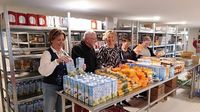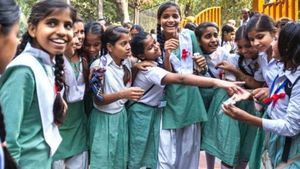In the Netherlands, food banks are raising alarm bells about a growing issue of silent poverty affecting communities across the country. In places like Veendam and Dronten, many residents who could benefit from assistance remain hidden due to feelings of shame and a lack of awareness about available resources. With a new campaign aimed at making food assistance more approachable, local food banks are working to address this pressing issue.
In Veendam, the Voedselbank Veendam (Food Bank Veendam) has reported that while they assist around 300 individuals annually with essential food supplies, there are approximately 2,800 residents in the area reliant on social benefits. This stark contrast highlights a troubling reality where many eligible individuals do not seek help. "Shame and unfamiliarity play a major role in this reluctance," says secretary Yvonne Verhoeven. She emphasizes that circumstances such as divorce, illness, or job loss can lead anyone into financial distress, and reaching out for help should not be viewed as a failure.
Verhoeven notes that the food bank sees significant hesitance, particularly among the elderly and families. Many individuals believe they should be able to support themselves and their families without assistance. "But asking for help is not a shameful act," she insists. To combat this stigma, the food bank has launched a campaign encouraging people to come forward. Through this initiative, individuals living near the social minimum can now easily register for four weeks of food assistance, after which their needs will be reassessed.
The Voedselbank Veendam operates using a store model, allowing clients to select their own products, which Verhoeven believes empowers individuals by giving them more control over their choices. Additionally, each distribution includes a social moment where clients can enjoy coffee and engage in conversations, fostering a sense of community.
Meanwhile, in Dronten, the local food bank is echoing similar concerns. Residents in Biddinghuizen, Dronten, and Swifterbant are often hesitant to seek help due to shame and ignorance about the support available. Chairman Jaap Oosterveld of the Dronten food bank sees the consequences of this issue firsthand. He reports that while the food bank assisted 300 people in 2024, the actual number of those in need is likely much higher.
According to data from the Centraal Bureau voor de Statistiek, around 540,000 people in the Netherlands require food assistance, yet only a small fraction of them actually reach out to food banks. Research from Tilburg University further highlights that shame remains a significant barrier for many who find themselves temporarily in financial trouble.
To tackle this hidden poverty, food banks across the Netherlands are initiating a nationwide campaign aimed at making food assistance more approachable and less stigmatized. This campaign is designed to reach out to individuals who are entitled to help but remain invisible. It employs local media, social networks, and search engines to inform potential beneficiaries about available resources.
Moreover, healthcare providers, social workers, and municipal staff are being encouraged to identify signs of poverty more proactively and to refer individuals to food banks when necessary. Oosterveld emphasizes the importance of collaboration in ensuring that those in need receive the help they deserve. "It’s vital that we work together to ensure that people who need help actually get it," he states.
The Dronten food bank is entirely operated by a dedicated team of around one hundred volunteers. In addition to distributing food packages, the organization is committed to reducing food waste and promoting self-reliance among residents. This holistic approach not only addresses immediate needs but also aims to empower individuals to regain their independence.
As the campaign unfolds, both Verhoeven and Oosterveld hope to see a shift in attitudes towards seeking help. They stress that the goal is to normalize the conversation around food assistance and to encourage those who are struggling to reach out for support. With ongoing efforts to dismantle the stigma surrounding food insecurity, local food banks are determined to ensure that no one has to face hunger alone.
In conclusion, the efforts by food banks in Veendam and Dronten reflect a broader movement across the Netherlands to address the issue of silent poverty. By fostering open discussions about food assistance and encouraging individuals to seek help, these organizations are working tirelessly to ensure that everyone has access to the basic necessities of life.




